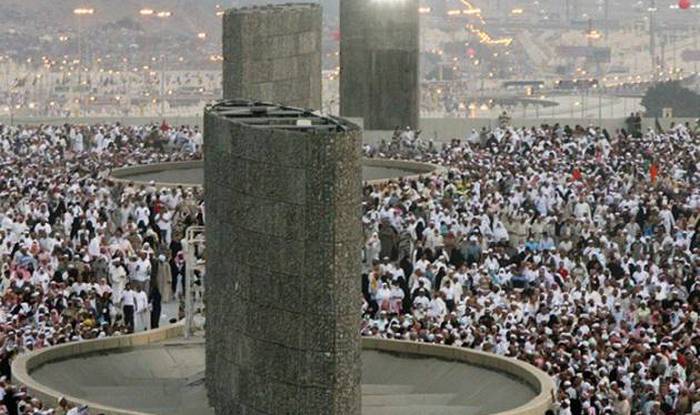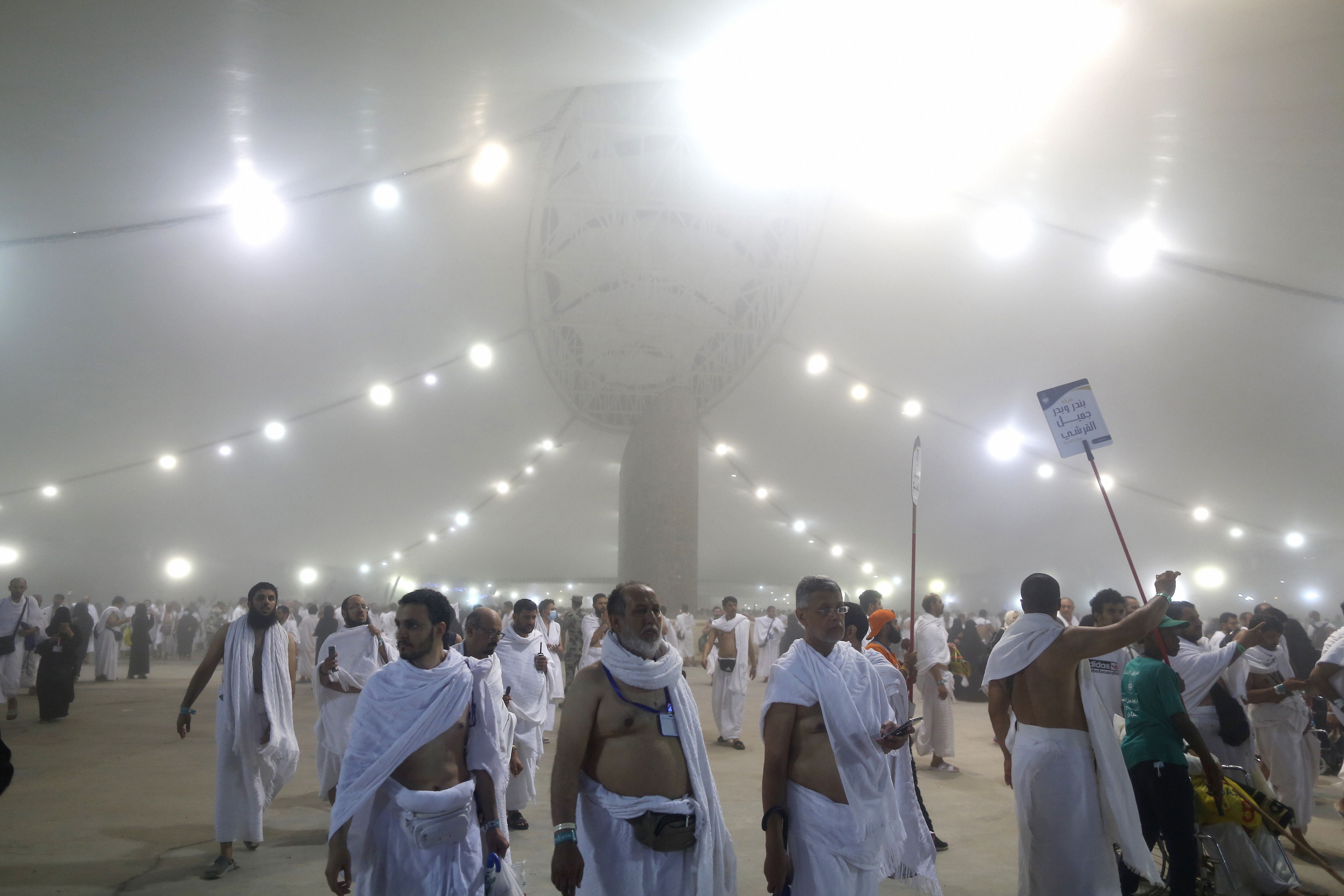Mina, Aug 11: Almost 2.5 million Muslim pilgrims took part Sunday in the "stoning of the devil", the last major ritual of the annual hajj pilgrimage and one that has in past years led to deadly stampedes.
Carrying pebbles in the scorching heat, worshippers made their way across Mina Valley near Mecca in western Saudi Arabia to symbolically "humiliate" the devil.
Under the watchful eyes of security forces, waves of pilgrims clad in white threw seven stones each at a pillar symbolising Satan.
"It is hot, I drink a lot of water and I am still hidden under my umbrella," said Jaker Akjar, a 48-year-old Indian pilgrim, sporting a henna-dyed beard.
This was Akjar's first hajj, one of the five pillars of Islam that every Muslim is required to complete at least once in their lifetime if they are healthy enough and have the means to do so.
Muslim tradition holds that pilgrims must throw seven stones each at a pillar representing Satan on the first day of Eid al-Adha, following two days of prayer and meditation.
"I am well equipped and ready" to fight the devil, said Umar, a 33-year-old Saudi engineer, carrying pebbles in a plastic bottle.
The hajj, one of the world's largest religious gatherings, this year officially drew 2.49 million pilgrims to Islam's holiest sites in Saudi Arabia.
And the stoning ritual is not without risk, as millions of pilgrims converge on a tight space and the pebbles often miss their mark amid the screams of worshippers.
Mina has been the site of deadly stampedes such as in 2015 when more than 2,300 pilgrims crushed or suffocated to death.
Authorities have since reinforced safety and security measures.
Tens of thousands of security forces, including police and civil defence, have been deployed for hajj, according to Saudi authorities.
Ambulances are mobilised to assist the faithful, cameras follow their movement, helicopters constantly fly over this valley of white tents that only comes alive once a year during the hajj.
Large fans sprayed water over the crowd amid soaring temperatures.
Saudi Arabia's King Salman made the trip to Mina on Saturday and was seen on state-run television observing worshippers from the window of a high-rise.
"We pray to Allah almighty to... accept their pilgrimage and worship," he tweeted on Sunday, which marked the beginning of Eid al-Adha, the festival of sacrifice.
Muslims traditionally slaughter sheep for the three-day holiday in tribute to Prophet Abraham's sacrifice of a lamb after God at the last moment spared Ishmael, his son.
They consume some of the meat and give the rest to poor people unable to buy food.
Pilgrims can purchase coupons from the Saudi government, which organises the slaughter and freezing of the meat to avoid public health problems.
After the stoning ritual, pilgrims return to the Grand Mosque in Mecca to perform a final "tawaf" or circling of the Kaaba.


Let the Truth be known. If you read VB and like VB, please be a VB Supporter and Help us deliver the Truth to one and all.
Indore (PTI): The Indore bench of Madhya Pradesh High Court on Tuesday set up a commission of inquiry comprising a former HC judge to probe the issue of water contamination in city's Bhagirathpura, saying the matter requires probe by an independent, credible authority and "urgent judicial scrutiny".
It also directed the commission to submit an interim report after four weeks from the date of commencement of proceedings.
A division bench of Justices Vijay Kumar Shukla and Alok Awasthi constituted the commission while hearing several public interest litigations (PILs) filed simultaneously regarding the deaths of several people in Bhagirathpura due to the consumption of contaminated water.
The HC reserved the order after hearing all the parties during the day, and released it late at night.
The state government on Tuesday told the HC that the deaths of 16 people in Indore's Bhagirathpura area was possibly linked to a month-long outbreak of vomiting and diarrhoea caused by contaminated drinking water.
The government presented an audit report of 23 deaths from the current gastroenteritis epidemic in Bhagirathpura before the bench, suggesting that 16 of these fatalities may have been linked to the outbreak of vomiting and diarrhoea caused by contaminated drinking water.
The report, prepared by a committee of five experts from the city's Government Mahatma Gandhi Memorial Medical College, stated that the deaths of four people in Bhagirathpura were unrelated to the outbreak, while no conclusion could be reached regarding the cause of death of three other people in the area.
During the hearing, the high court sought to know from the state government the scientific basis behind its report.
The division bench also expressed surprise at the state government's use of the term "verbal autopsy" in relation to the report, sarcastically stating that it had heard the term for the first time.
The HC expressed concern over the Bhagirathpura case, stating that the situation was "alarming," and noted that cases of people falling ill due to contaminated drinking water have also been reported in Mhow, near Indore.
In its order, the HC said the serious issue concerning contamination of the drinking water supply in Bhagirathpura area allegedly resulted in widespread health hazards to residents, including children and elderly persons.
According to the petitioners and media reports, death toll is about 30 till today, but the report depicts only 16 without any basis or record, it said.
It is averred that sewage mixing, leakage in the pipeline, and failure of civic authorities to maintain potable water standards have led to the outbreak of water-borne diseases. Photographs, medical reports, and complaints submitted to the authorities prima facie indicate a matter requiring urgent judicial scrutiny, the HC said.
"Considering the gravity of the allegation and affecting the right to life under Article 21 of the Constitution of India and the need for an independent fact-finding exercise, the Court is of the opinion that the matter requires investigation by an independent, credible authority," it said.
"Accordingly, we appoint Justice Sushil Kumar Gupta, former judge of the Madhya Pradesh High Court, a one-man commission of inquiry into the issues relating to water contamination in Bhagirathpura, Indore, and its impact on other areas of the city," the HC added.
As per the order, the commission shall inquire into and submit a report on the cause of contamination -- whether the drinking water supplied to Bhagirathpura was contaminated; and the source and nature of contamination (sewage ingress, industrial discharge, pipeline damage etc).
The panel will also probe the number of actual deaths of affected residents on account of contaminated water; find out the nature of disease reported and adequacy of medical response and preventive measures; suggest immediate steps required to ensure safe drinking water as well as long-term infrastructural and monitoring reforms.
It will also identify and fix responsibility upon the officers and officials found prima facie responsible for the Bhagirathpura water contamination incident, and suggest guidelines for compensation to affected residents, particularly vulnerable sections.
The commission shall have powers of a civil court for the purpose of summoning officials and witnesses; calling up records from the government department, hospitals, laboratories and civic bodies; ordering water quality testing through accredited laboratories; conducting spot inspections.
All state authorities involving district administration, Indore Municipal Corporation, public health engineering department and Madhya Pradesh Pollution Control Board shall extend full co-operation and provide records as sought by the commission, it said.
The state government shall provide office space, staff, and logistical support to the commission, it said.
During the hearing in the day, the state government also presented a status report to the court in this matter.
According to reports, a total of 454 patients were admitted to local hospitals during the vomiting and diarrhea outbreak, of whom 441 have been discharged after treatment, and 11 are currently hospitalised.
According to officials, due to a leak in the municipal drinking water pipeline in Bhagirathpura, sewage from a toilet was also mixed in the water.





